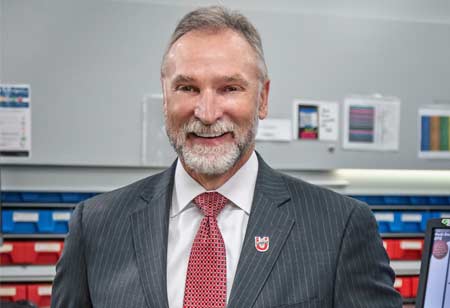Robert is an entrepreneurial senior healthcare executive with a demonstrated history of working in the hospital & health care industry. He is skilled in hospital pharmacy, 340b operations, pharmacotherapy, pharmacokinetics, parenteral nutrition, healthcare supply chain, consulting, imaging, laboratory services, and physical/occupational/speech therapies.
Please tell us about the journey that you've had so far and your roles and responsibilities at UofL Health.
I've been a pharmacist for 40 years and spent 25 years in pharmacy leadership at the corporate and national levels. During my tenure with a for-profit system in Nashville, I oversaw more than 200 hospitals spanning 38 states and five time zones. It was in this role that we developed and implemented robust policies, procedures, and controls for handling controlled substances, emphasizing surveillance and accountability. The methods and equipment we established have been tested and proven effective over nearly two decades.
In my current position, I hold responsibility for all pharmacy operations across our extensive system, encompassing eight hospitals with a combined total of 1700 beds. We have several freestanding emergency departments and surgery centers and employs over a thousand physicians, as well as 13,000 staff members. We have inpatient operations as well as outpatient operations ranging from retail to specialty pharmacy and infusion. Our team comprises over 300 pharmacy personnel, including 16 pharmacy residents.
I joined UofL during a pivotal period when we acquired seven hospitals and medical centers from CHI. Today we stand as the largest academic health system in the state. Our university hospital features a level one trauma center, a level three neonatal intensive care unit (NICU), the state's sole burn center, a stroke center, transplant services, and a substantial multi-site specialty cancer center that incorporates cutting-edge cell therapies.
What are some of the major challenges in the market when it comes to controlled substance accountability space?
Establishing a comprehensive interdisciplinary committee to assess potential issues in hospitals is a crucial yet challenging task. This responsibility should not solely rest on the shoulders of the pharmacy; instead, it demands executive leadership involvement from the CEO level throughout the organization. The organization needs to establish a culture of accountability and need to be ever vigilant. It's imperative to operate under the assumption that there could be potential problems, necessitating ongoing audits, monitoring, and a proactive approach to strengthen control measures continually.
“It is imperative to forge an interdisciplinary team, guided by the organization’s CEO, to cultivate a culture of accountability that resonates throughout the entire organization”
In our organization, we go beyond focusing solely on DEA controlled substances. We've identified a list of non-controlled substances, such as costly drugs like Botox, Sildenafil (Viagra), Propofol, Precedex, Flexeril, Toradol, and others, which we treat with the same level of scrutiny due to their potential for drug diversion. In addition, we monitor drugs that could be used as substitutes for controlled substances, such as evaluating Benadryl and other sedatives.



